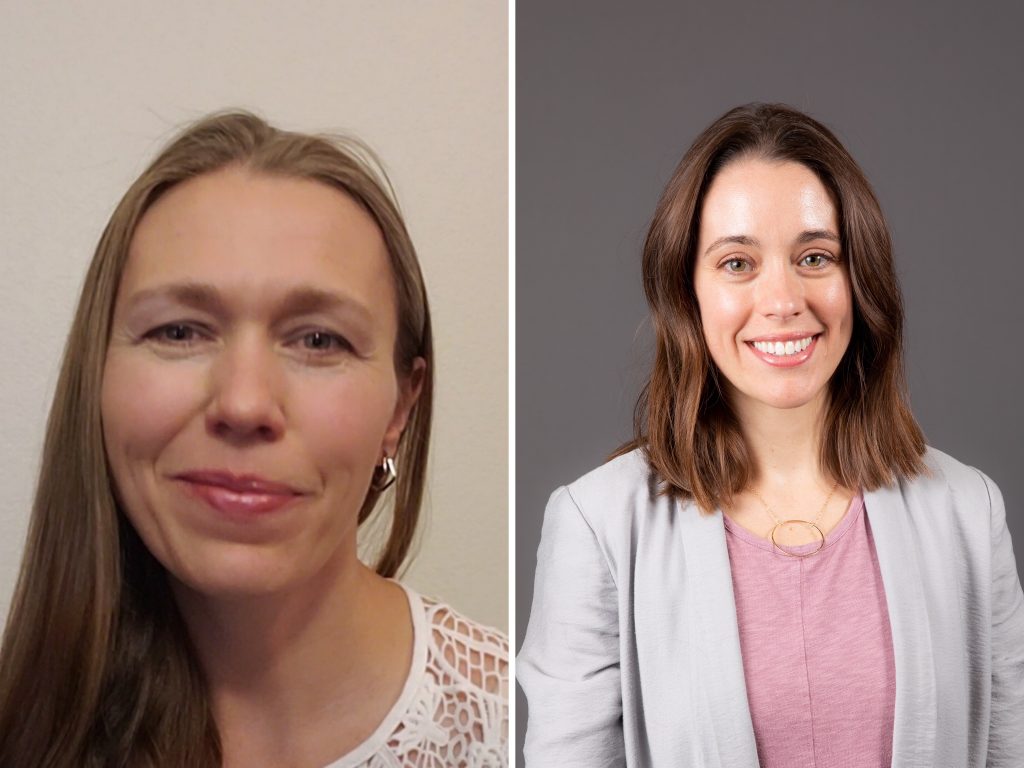What we build—and what we lose in the process—are essential calculations for understanding the climate crisis and beginning to solve it, according to the first recipients of a new climate education award at Northern Arizona University. Alder Keleman Saxena, an assistant professor of anthropology, and Jennifer Wade, an assistant professor of mechanical engineering, will use the first McAllister Climate Education, Engagement and Design (CEED) Fellowships to tackle problems arising from human-caused climate change with their students. While Wade is testing an experimental approach to removing carbon from the atmosphere and Keleman Saxena is designing a course on climate change and infrastructure in the region, both are investigating the loss associated with climate solutions of the past as they work with students to take on the problems of our warmer future.
Wade will use the CEED fellowship to characterize materials that can remove carbon dioxide from the air using moisture. She will also develop new ways to teach students and community members about the diversity of climate solutions needed to meet our climate challenge, including decarbonizing the energy sector and direct air capture.
Wade is adapting a method called electrochemical impedance spectroscopy, which will allow her to analyze how ionically charged compounds skim carbon from dry air. Instead of using heat to regenerate the air capture materials, as other carbon capture technologies rely on, this method uses changes in moisture to do so. As Wade tests the feasibility of this technique, she is asking how to minimize the water lost—the major “ecological expense” involved in this approach.
“At the end of the day, we want this material to separate carbon quickly so we need less of it, and use the least amount of water possible,” she said. “A major part of the solution to our climate problem is turning off the carbon faucet, but at this point, we know it can’t be the only solution.”
Wade, who is involved in NAU’s Sustainable Campus Ecosystem Initiative and developing NAU’s new climate action plan, is working to communicate climate solutions beyond the laboratory and classroom. One way she’s doing that is by testing safe, low-impact ways to demonstrate how carbon capture works with her kids, including practicing pH indicator experiments using cabbage, curry powder, and hydrangeas. By blowing bubbles through a drinking straw, we show how our own acidic CO2 emissions can be trapped with any basic material (for example, alkaline water from the grocery store).
But Wade says the subsequent challenge is just as important: “What do we do next? How can we regenerate the CO2 to either permanently store or reuse?”
Keleman Saxena will use the fellowship year to develop a multi-disciplinary course on climate and infrastructure on the Colorado Plateau. The course, slated for Spring 2022, will incorporate theory, field trips to infrastructure sites near Flagstaff and visits to archives at Cline Library to explore the impact of large-scale environmental interventions in the region. Students will work in groups to create a public-facing presentation using materials from the archives. The course draws on Feral Atlas: The More-than-Human Anthropocene, an open-access digital environmental humanities publication that Keleman Saxena co-edited.
“It can be easy to get so focused on the urgencies of the problems around climate change that we forget about history, and specifically the history of technology,” Keleman Saxena said.
She hopes encounters in both the field and archives will spark her students to think about the historical relationship of roads, dams and other interventions to environmental change. “It’s really important that we think about the follow-up consequences of technology as we imagine new ways to respond.”
The McAllister CEED Fellowships are designed to support early-career faculty and teaching staff at Northern Arizona University in developing high-impact scholarship or programming in the areas of climate change, climate justice, and climate-related science communication. The $10,000 awards are made by the Frances B. McAllister Endowed Chair on Community, Culture, and Environment, which was established in 2008 by the late Flagstaff philanthropist Frances B. McAllister.
“Alder and Jennifer are approaching some of our most urgent climate questions with rigorous scholarship and creativity,” said Bruce Hungate, chair of the McAllister Program and director of the Center for Ecosystem Science and Society at NAU. “The climate conversations they are starting are exactly the kind the McAllister program seeks to elevate.”
“We really admired the way these scholars take a place-based approach to climate teaching and research,” said Kate Petersen, assistant director of the Center for Ecosystem Science and Society, who coordinates the McAllister program with Hungate. “Their projects demonstrate how necessary community is to meaningfully address the climate problems we face.”
Though warnings about catastrophic tipping points and the sheer scale of global climate upheaval can be daunting to study, both Keleman Saxena and Wade encourage their students to find their place in the narrative.
“The scale of the climate threat can make it hard to locate yourself in that story as someone with power and agency,” Keleman Saxena said. “I encourage my students to find a small piece of the problem to work on. Thinking about really concrete infrastructure reminds us we have choices about how we build our environments, how we interact with the living and non-living, and those choices could lead us to a different future.”
Wade has seen her students empowered to take on climate problems, too. “‘Before taking your class, I thought everything was already figured out,’ one of my students told me. ‘But it’s not all in a textbook anymore. There’s so much more work to do.’”
Kate Petersen | Center for Ecosystem Science and Society




